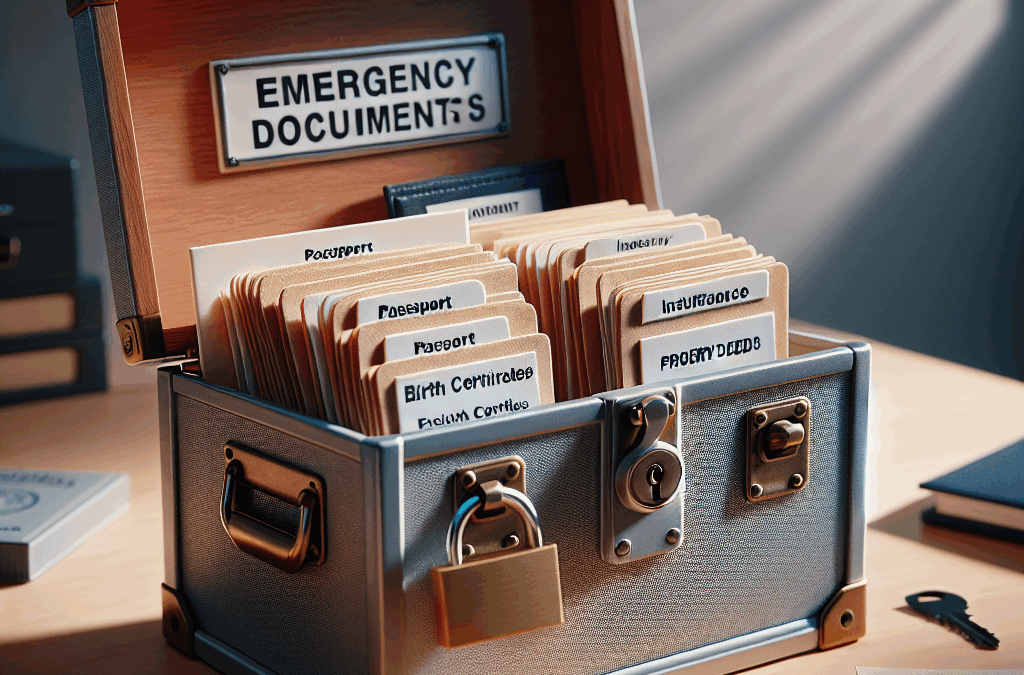Prioritize What Documents to Store
Understanding Essential Documents
When I first thought about storing emergency documents, I had to figure out what was truly essential. It’s not just about what’s important to me, but what I’ll need in a pinch. Think about your identification, medical records, and financial information. These are the cornerstone of your emergency document collection.
Next, consider any legal documents like wills or property deeds. Each one plays a vital role when you’re in a crisis. It’s easy to overlook these, but getting caught without a will or proof of ownership can complicate matters when the unthinkable happens. So, make a list of everything that’s critical for your immediate safety and future peace of mind.
Don’t forget personal contacts too! I find it incredibly useful to have an emergency contact list. Make sure this includes family, friends, and even important service providers. You never know who might need to step in when you’re caught off guard, and having this info easily accessible can save you a lot of stress.
Choosing the Right Storage Method
Diving into Physical Storage Options
Okay, so you’ve figured out what documents to store. Now, how do you actually keep them safe? The first choice is physical storage. I personally use a fireproof safe at home. This helps keep my important documents safe from theft and potential disasters like fires.
For documents that I don’t need to access daily, I prefer filing them away neatly in labeled folders. Honestly, nothing beats the feeling of knowing everything is in its place. Plus, if someone else needs to find something in an emergency, it’ll be a breeze for them.
Another handy trick I’ve learned is to keep an emergency document kit in my car. You never know when you might be out and need access to your important papers. Having a portable solution has definitely come in handy for me more than once.
Thank you for reading this post, don't forget to subscribe NOW for FREE!
Digital Storage Solutions
The Power of Cloud Storage
In today’s tech-savvy world, I can’t recommend digital storage enough. Cloud storage has been a game changer for me. It’s as easy as uploading scans or photos of my important documents. Plus, I love being able to access them from anywhere, which is super reassuring when you’re on the go.
While I enjoy the convenience, I also make sure that I use a reputable and secure cloud service. Trust me, you don’t want to find out the hard way that your documents were compromised! Always look for services that offer encryption and strong password protection.
To be even more secure, I also keep a backup on an external USB drive. This allows me to have a secondary option if everything else goes south. You can never be too careful, right?
Regular Backups and Updates
Keeping Things Fresh
Something I’ve learned through the years is how crucial it is to regularly back up and update my documents. I set a reminder for myself every six months to check in on my document storage. I ask myself if anything’s changed. Have I moved? Did I get a new job? Did someone in my family get married? All these little life changes could absolutely impact the documents I need to have on hand.
It’s also important to replace any documents that may have expired. I can’t tell you how many times I’ve had to scramble to get a new driver’s license or update my health insurance papers. Making this a routine can save you from a boatload of hassle when something unexpected comes up.
Lastly, don’t forget to delete any documents you no longer need. It’s surprising how much clutter can accumulate over the years. Regularly purging unnecessary documents will help keep your collection manageable and relevant.
Sharing Important Information
Telling Trusted Family and Friends
Once I’ve organized everything, the next step I take is to let a few trusted family members know where my documents are stored. This might seem like a no-brainer, but you’ll be amazed at how often people don’t think to share this crucial information with those who may need it in an emergency.
When I share, I usually explain which documents are where, and why they’re important. For example, if something were to happen to me, I want my partner to know where to find my will and insurance info without any hassle.
It can feel awkward at first, but trust me, you’ll feel much more at ease knowing your loved ones are in the loop. Plus, it opens up conversations about emergency planning – it’s a win-win situation!
FAQ
1. Why is it important to store emergency documents properly?
Storing emergency documents properly ensures they are safe from loss, theft, or damage. It allows for quick access during stressful situations, helping to preserve your peace of mind.
2. What types of documents should I prioritize?
Prioritize essential documents like identification, medical records, legal documents (like wills), and emergency contact lists. These are critical in emergencies.
3. How often should I update my stored documents?
I recommend updating your documents at least every six months. This helps ensure that everything remains relevant and accurate based on your life changes.
4. Is it safe to store documents digitally?
Yes, but make sure you use reliable cloud services that provide encryption and strong security measures. A backup on a USB drive is also a wise choice!
5. Who should I share my document storage information with?
Share your storage information with trusted family members or friends who may need access in an emergency. This can make a significant difference in a crisis.






